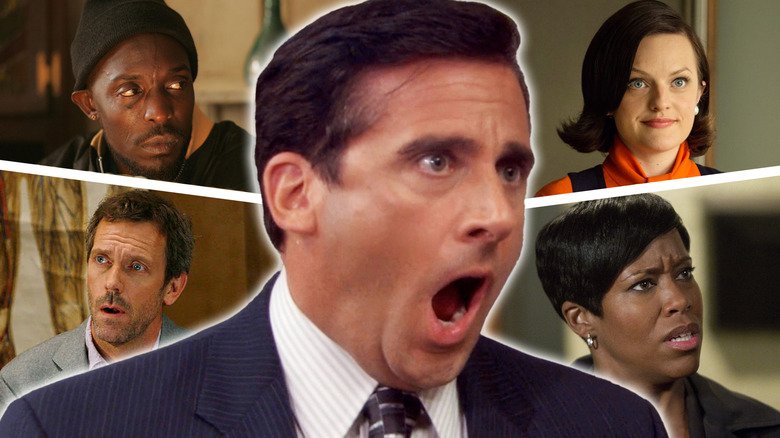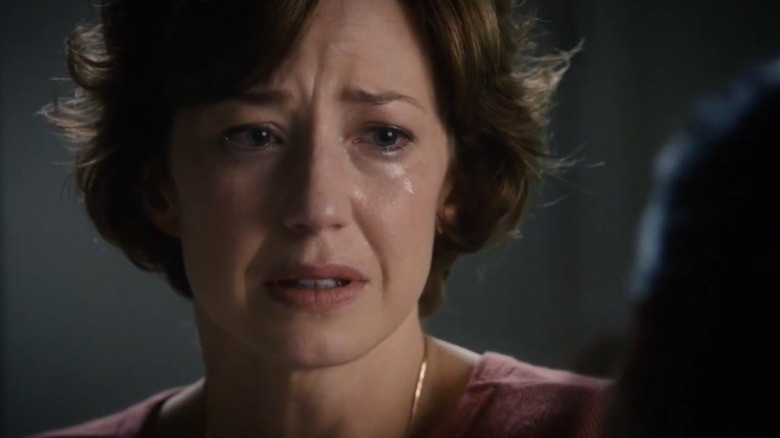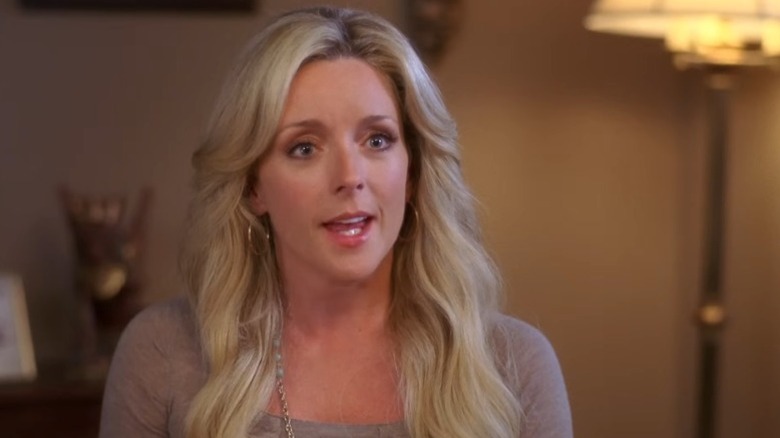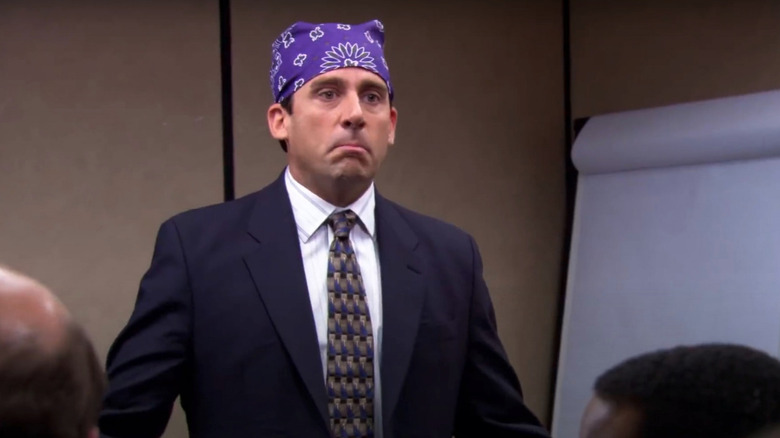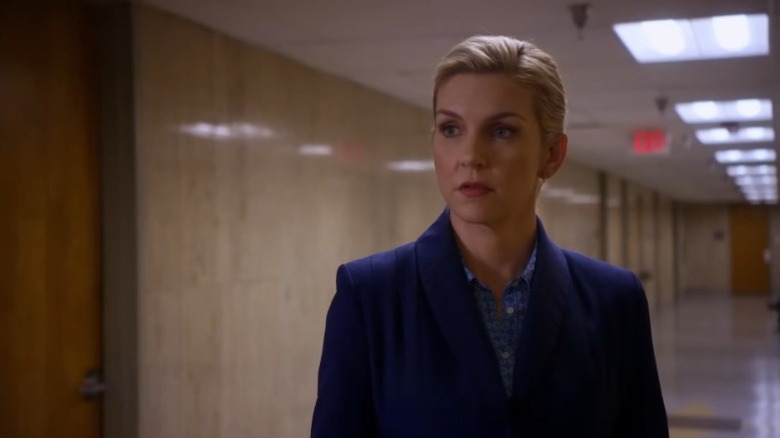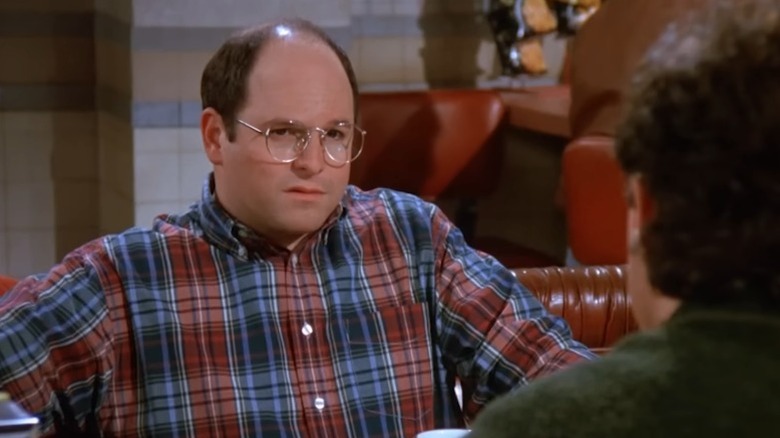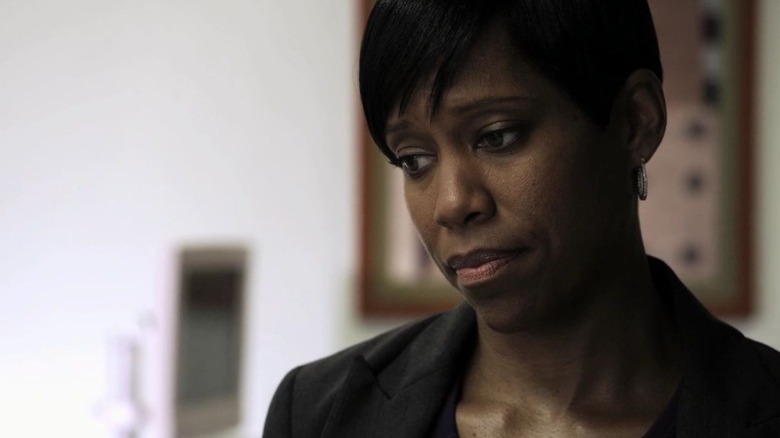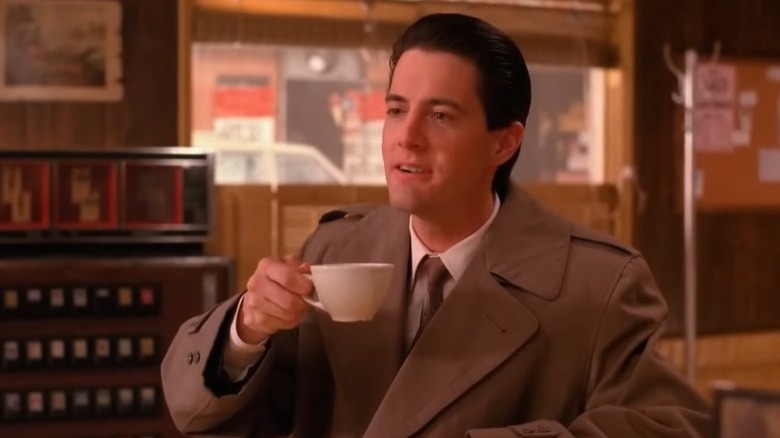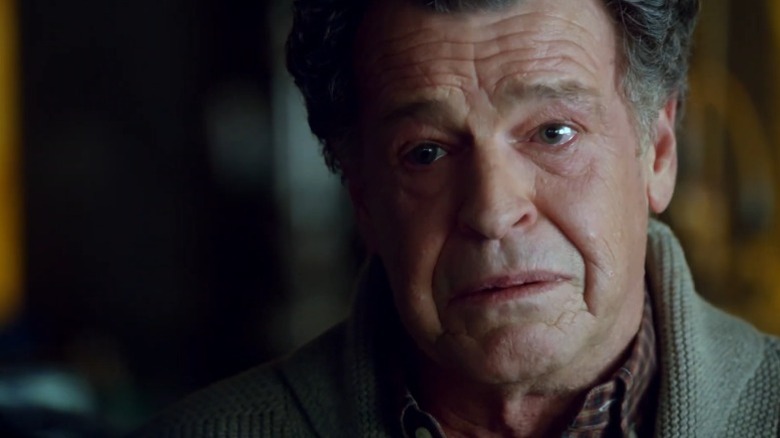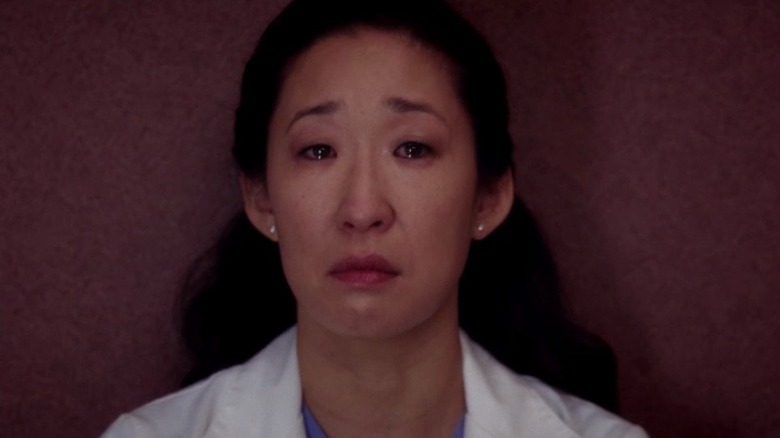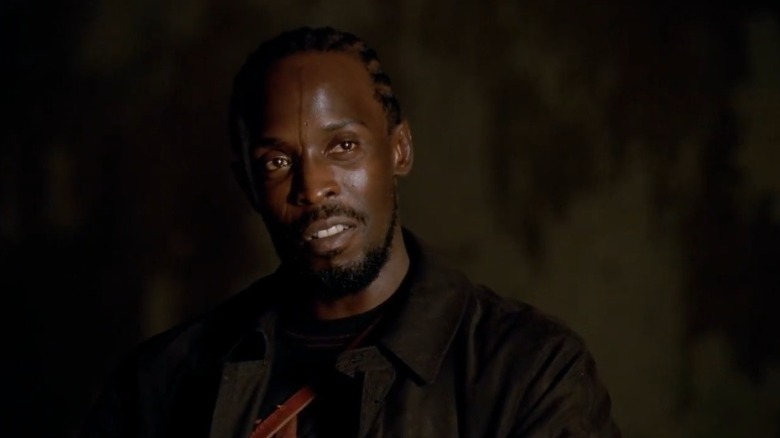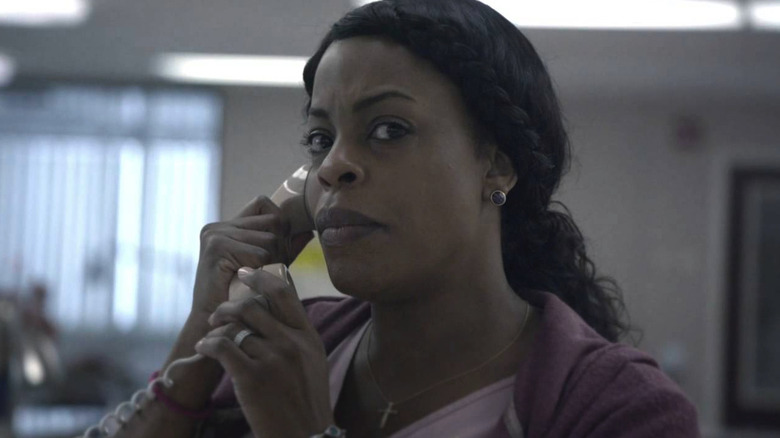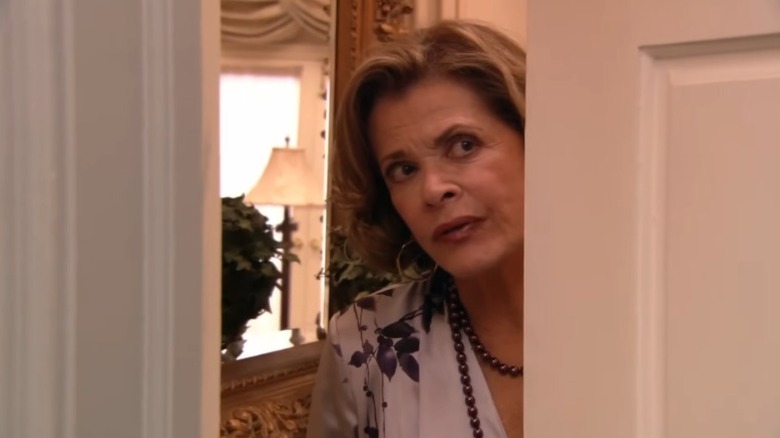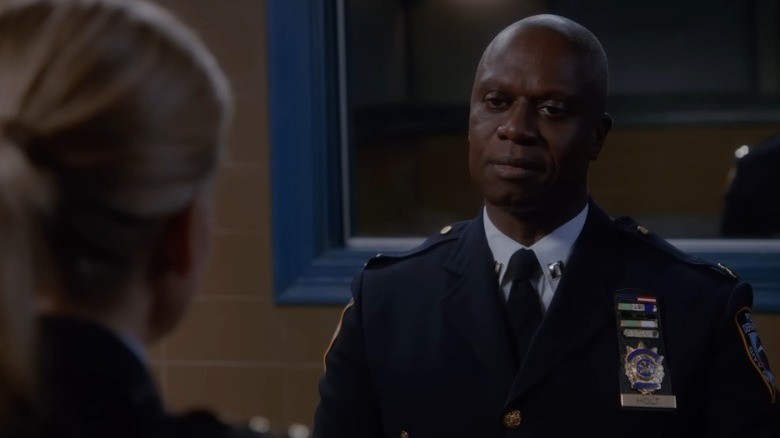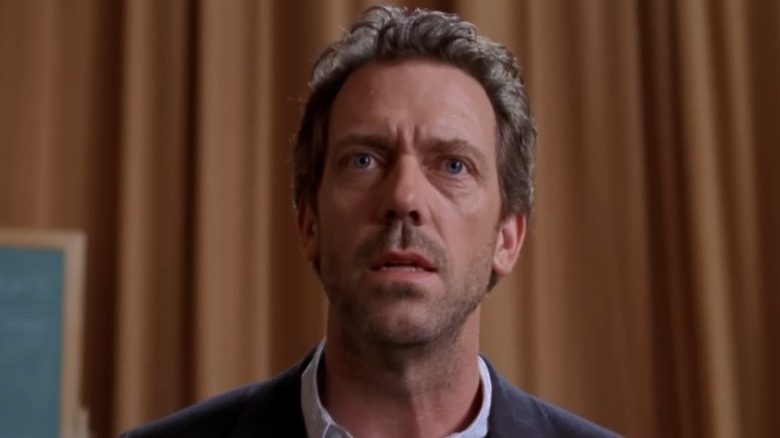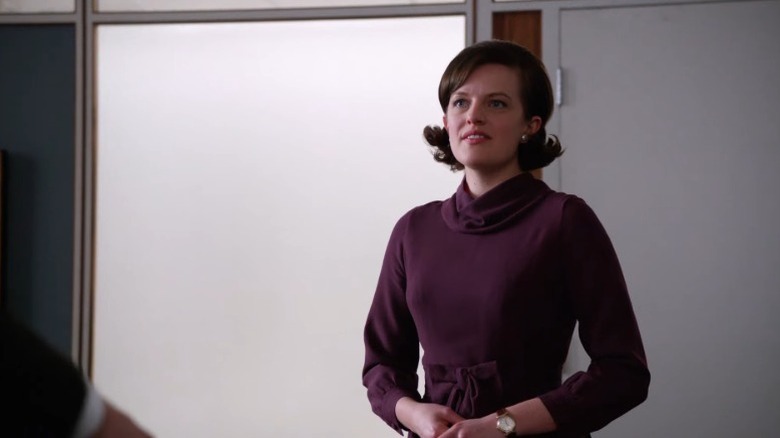The 15 Best TV Performances That Never Won An Emmy
On average, the Primetime Emmy Awards get things right a lot more often than other industry-standard awards like the Oscars or the Grammys, in part because they have more time to correct course. A snubbed show will often get its due at a later opportunity. But that only makes the cases of repeat wins over potentially more deserving newer shows more egregious.
This list collects the 15 most notorious and absurd instances of great TV performances getting persistently paid dust by the Television Academy (and this are just some of the offenses). Some of these actors had to endure successive years of defeats on live TV, like many shows that deserved a win, while others were never even nominated. But every one of them deserved better.
Here are 15 of the best TV performances that never won an Emmy.
Carrie Coon, The Leftovers
The fact that "The Leftovers," one of the greatest TV series of all time, only had a single Emmy nomination in its entire run (Outstanding Guest Actress for Ann Dowd in season 3) is a travesty in itself. But when it comes to Carrie Coon's work, the Emmys' cold shoulder to HBO's fraught supernatural drama is outright baffling.
Playing Nora Durst, who lost her entire family in the Sudden Departure and was thus left to wander the Earth as a perpetual cosmic punchline, was an exceedingly difficult task. Here was a woman who fought ferociously not to let her life or her public image be defined solely by grief and loneliness, and yet her every action and decision was heavy with the weight of ineffectual coping. Coon had to honor Nora's oceanic suffering, hardened shell of functionality, irascible resistance to healing, multiple layers of desperate performance, and simultaneous rejection of and desire for pity all at once.
Not only did she rise to that impossible task from the best episode in season 1 onward, but she made Nora into one of television's most towering tragic figures — a human raw nerve whose emotional depth and psychological legibility were only matched by her hypnotically abrasive personality. It was self-evidently an all-timer performance for anybody who was paying attention; unfortunately, that didn't include Emmy voters.
Jane Krakowski, 30 Rock
If "30 Rock" was a relentless joke generation machine — the closest American television has gotten to a bonafide live-action cartoon, with all the elasticity and haywire creativity that implies — then Jane Krakowski's Jenna Maroney was its Bugs Bunny, Daffy Duck, and Bugs-Bunny-in-drag all rolled into one, with a dash of Coyote at her most delusionally scheming. Although she lost the Emmy all four times she was nominated, the sheer indefatigable energy that Krakowski exhibited across every season of "30 Rock," never once giving less than 200% to any of Jenna's insane one-liners and reactions and songs and physical stunts, was astonishing, all the more so because she kept hitting upon belly laugh after belly laugh.
She was helped, of course, by the writing, which fashioned Jenna into a deranged fame-hungry supervillainess so lovingly and admiringly, with so many layers of elaborate subcelebrity lore, that it was impossible not to be in awe of her. But not a single Jenna gag would have landed without the exact right performer — and Krakowski, who later worked magic again and got repeatedly snubbed by the Emmys again on "Unbreakable Kimmy Schmidt," was just that.
Steve Carell, The Office
Wait, Steve Carell never won an Emmy for "The Office?" Yep, you read that right, dear reader, as bizarre as it might sound. Across his legendary seven-year run on the NBC show that made the documentary style feel natural for American television comedy, Carell was nominated for six Emmys for Outstanding Lead Actor in a Comedy Serie — and he lost all six.
In a way, it's kind of hilarious that such a fate should befall the performer of Michael Scott specifically — the very awards-obsessed dork who kept dragging his employees into the Dundies. Repeatedly losing an award that should be a no-brainer is almost like something that would happen to Michael Scott within the universe of "The Office," had Michael ever been competent enough at his job to be deserving of industry awards. But those thoughts don't assuage the sting of arguably the defining sitcom performance of the 2000s going down empty-handed into the annals of Emmy history; it's as though James Gandolfini or Bryan Cranston had never won.
Rhea Seehorn, Better Call Saul
With 53 nods, "Breaking Bad" spin-off "Better Call Saul" broke the record for most Primetime Emmy nominations without a win, which, once again, is drolly amusing as an ironic twist of fate that could have come straight out of the life of Jimmy McGill (Bob Odenkirk) himself. That's the closest thing there can be to consolation for the fact that Rhea Seehorn never won.
"Better Call Saul" had consistently excellent writing and directing, with the kind of patient, novelistic, character-specific storytelling that falls to actors like a gift from the gods — but no one was more benefited by it than Seehorn. As the seemingly level-headed Kim Wexler, whose taciturn composure turns out to belie an even greater affinity for mess and deception than Jimmy's and a significantly more tortured moral conscience, Seehorn created a paradoxical wonder with a fireworks display of unshowiness. She was so believable as Kim, so endlessly attuned to her private anxieties and hesitant gestures, that it was easy to forget she was an actress. The Emmys certainly forgot.
Jason Alexander, Seinfeld
The Emmys were having a love affair with Michael Richards for a good deal of the series run of "Seinfeld." His performance as Cosmo Kramer won Outstanding Supporting Actor in a Comedy Series thrice, in 1993, 1994, and 1997, essentially playing give-and-go with David Hyde Pierce on "Frasier" for the better part of the '90s. The downside of that massively successful run for Richards is that Jason Alexander never won.
It goes without saying that George Constanza, the Larry David self-insert (give or take some differences) who most readily embodied the show's philosophy of cackling existential absurdism, is a television icon. But what doesn't get said as often is how important Alexander's acting was to the realization of the George Constanza project. The show would never have become what it was without his dauntless commitment to every facet of George: the perfect sad-sack awkwardness, the barely-suppressed rage, the sociopathy which made it so it didn't feel bad to laugh at him, the weary self-awareness that suddenly had you laughing with him. It's a serious claimant to the title of best sitcom performance ever. And yet.
Regina King, Southland
Following decades of phenomenal film and TV work, including a canonical body of voice acting work across four seasons of "The Boondocks," Regina King rightfully became an Emmy darling in the late 2010s, collecting four awards for four different performances on "American Crime," "Seven Seconds," and HBO's hit series "Watchmen." But her Emmys domination should have started even earlier, as soon as she began starring on "Southland."
An unembellished and brutally realistic look at the lives of an LAPD detective team, "Southland" deviated from the crop of police procedurals with its stringent focus on character, interpersonal drama, and social commentary — which may be why it never became a ratings hit, moved from NBC to TNT on season 2, and went entirely ignored by the Emmys aside from the Stunt Coordination category. As a result, despite BET, NAACP, and Critics' Choice nominations, King never got the big one for her incredible work as Det. Lydia Adams — a character who, with her frantic pragmatism and badass exterior hiding deep recesses of vulnerability, laid the groundwork for every subsequent Emmy-winning Regina King performance.
Kyle MacLachlan, Twin Peaks
It takes a special level of miraculous dramatic lavishness to get multiple generations to obsess over the way you say "That's a damn fine cup of coffee." Playing Special Agent Dale Cooper on "Twin Peaks," Kyle MacLachlan was a miraculous actor on a miraculous show. If the two original ABC seasons in 1990 and 1991 wowed the world with their singular version of a small town murder mystery, it was largely due to the exuberance and effectiveness of MacLachlan, whose radically unconventional take on an FBI agent protagonist was both "Twin Peaks'" dependable center and most destabilizing force.
Then, on 2017's "Twin Peaks: The Return," the soft-spoken and lovably eccentric Dale Cooper re-emerged as a tragic, existentially encumbered figure. In the same way that the likes of Naomi Watts and Laura Dern had in the intervening years, MacLachlan became a conduit for David Lynch's boundless experimentalism, stretched out into multiple characters and performances flowing in and out of each other. And yet, somehow, not once in those three seasons of wildly varied and invariably excellent work did MacLachlan win an Emmy. He wasn't even nominated for "The Return." Go figure.
John Noble, Fringe
"Fringe" was never nominated for any above-the-line Emmys, which is patently ridiculous. Its five seasons of airtight sci-fi TV constitute one of the greatest achievements in the genre's history. Even so, had it aired after the Emmy wins of "Orphan Black'"s Tatiana Maslany and "Mr. Robot'"s Rami Malek, in a world where the Television Academy was more open to acknowledging great acting in the sci-fi genre, "Fringe" might have netted at least a couple of laurels for John Noble.
Then again, that scenario would be a time paradox: Both "Orphan Black" and "Mr. Robot" probably wouldn't have existed without "Fringe," the show that made the case for sci-fi as a fertile ground for philosophically and emotionally outreaching television in the Prestige TV era. More to the point, they wouldn't have existed without John Noble, whose work as tormented mad scientist Dr. Walter Bishop was so monumental that its omission single-handedly laid bare the Emmys' anti-genre bias for years on end. It was the role of Noble's life, and he was nuanced, imperious, vulnerable, funny, whimsical, heartrending — patently award-worthy, in short, on a show too good for awards.
Sandra Oh, Grey's Anatomy
At its peak, ABC's "Grey's Anatomy" knew how to concoct a grand dramatic spectacle like nothing else on television. Its most tear-jerking hours are the stuff of actorly dreams, expressly designed to let emotions run wild and free with no safeguards of tastefulness or propriety or even realism. The show's 20 total Emmy acting nominations and two wins — for Katherine Heigl (Supporting Actress, 2007) and Loretta Devine (Guest Actress, 2011) — are a testament to that. Yet, strangely, enough, the best and most iconic "Grey's" performance never won.
A veteran of acclaimed indie cinema and underrated HBO shows prior to donning Dr. Cristina Yang's lab coat, Sandra Oh was the very first "Grey's Anatomy" actor to nab Emmy recognition, all the way back on season 1. Her performance as Cristina was just that majestic from the get-go, a stunning feat of rugged anti-sentimentalism that at once grounded and deepened the show's ensemble alchemy. As "Grey's" got bigger and Christina got messier, Oh was nominated five more times, and preposterously lost every single one. In fact, adding up her four acting losses for "Killing Eve," Oh may well be the acting world's foremost Emmy snubbee at present.
Michael K. Williams, The Wire
As you may have noticed by now, shows that got inexplicably shafted by the Emmys across the board are a running theme of this list, and there may be no more egregious case of that than "The Wire," which only had two nominations for writing despite being maybe the greatest show of all time. Given the rarefied level of excellence we're talking about, there are numerous actors whose lack of plaudits for "The Wire" is scandalous — but to never give so much as a nomination to the late Michael K. Williams, whose performance as gay stick-up man Omar Little ranks among the most iconic in TV history, is some kind of offense against the very tenets of art and taste.
In an ensemble teeming with fascinating and multi-dimensional characters, Williams made Omar an elementary stand-out, a figure of spellbinding menace and disarming tenderness, able to fuse apparent contradictions into a fully-rounded human whose presence alone made cop show archetypes look silly; he understood the character so thoroughly as to personally push for Omar's sexuality to be embraced more. Williams had four nominations for other programs later on, but, with or without Emmys, he was one of the best to ever do it.
Niecy Nash, Getting On
As an underseen, darkly hilarious dramedy that stuck to its guns and offered just six episodes of self-effacing medical storytelling per season, HBO's "Getting On" was the kind of show that seemed almost destined to be acclaimed by critics and snubbed by the Emmys. It did, however, star Laurie Metcalf, Niecy Nash, and Alex Borstein, so it managed to get some attention from the acting branch.
Nash, in particular, earned consecutive nominations for Comedy Supporting Actress in 2015 and 2016, but won neither award. Still, the fact that she managed to receive that much industry attention for such a little-seen show goes to showing what a powerhouse she was on "Getting On." Playing return-to-work nurse Denise "Didi" Ortley, who provides a lifeboat of humanity for her patients amid the insanity of Mount Palms Memorial Hospital's extended care unit, Nash gave one of the most sensitive, fine-grained, and all-around perfect TV performances of the 2010s, lending vibrancy and gestural depth to a character defined by her poise and lack of theatrics. Add to that the fact that Nash was an over-the-top comedy master playing against type, and her achievement on "Getting On" becomes stunning — as does its lack of Emmy recognition.
Jessica Walter, Arrested Development
For all the flowers it gets as one of the best sitcoms of all time, "Arrested Development" remains somewhat underdiscussed as a feat of ensemble gathering: Every single actor in its main cast gave an all-timer sitcom performance, won zero Emmys for it, and then went on to become film and/or TV royalty on other projects — if they weren't that already. Jessica Walter was that already but got snubbed by the Emmys all the same.
Lucille Bluth, the snooty, ruthlessly manipulative, incorrigibly snarky, functionally alcoholic matriarch of the Bluth family, remains one of the most incredible TV characters ever whether the Emmys acknowledged it or not. Watching Walter's performance on the show's three original Fox seasons (as well as the stronger stretches of the experimental Netflix revival season, to be fair) is like getting invited to a masterclass in refined comedic timing and characterization, with every scream-cackle, bizarre wink, pregnant pause, and annoyed sideways glare taking the show's bountiful writing for Lucille and transforming it into high art before your eyes.
Andre Braugher, Brooklyn Nine-Nine
Andre Braugher was already a living legend and a veritable Emmy titan by the time "Brooklyn Nine-Nine" premiered in 2013, with wins for "Homicide: Life on The Street" and "Thief" and numerous other nominations under his belt. That legacy was, in fact, part of what the Fox (later NBC) police comedy was playing with by casting Braugher in the role of Raymond Holt, a regal and ice-cold police captain who gradually reveals himself to be the kookiest goofball in the cast.
Across its eight seasons, "Brooklyn Nine-Nine" seemed constantly in awe of the fact that it had tapped the Andre Braugher for its silly sitcom business, and lavished him with incredible material in a way that few shows have ever lavished an actor. From the expected (and always brilliant) deadpan retorts and comic displays of non-emotion to the gleeful flights of eccentricity to the unforgettable single-word bellows (always remembered: "Bone?!;" not sufficiently lauded: "Kase!"), Braugher gave a superstar performance that reinvented him for a new generation. It's downright bizarre that he never won an Emmy for it.
Hugh Laurie, House, M.D.
For a good deal of the run of "House M.D." on Fox between 2004 and 2012, television critics struggled with what to make of it. It was a kitschy, largely silly medical drama with such an unyielding commitment to formula that it bordered on camp if not outright self-parody, like a kind of dramatic "Phineas and Ferb" — so how come, on its best episodes, it reached a level of poignancy and narrative intelligence that nothing else on TV could match, to the point of suddenly snagging Emmys for writing and directing? All told, the answer to that critical conundrum was ultimately a simple, non-Emmy-winning one: Hugh Laurie.
Laurie's performance as Dr. Gregory House, a nihilist human supercomputer endlessly chasing solutions to medical problems as an escape from the black lake of his own heart, was so good that its presence on "House" felt almost like a gimmick. How do you not, against your better judgment, get roped into the whims and processes and existential maladies of such a spellbinding screen figure, repetitive as they may be? Not for nothing, Laurie's work as Dr. House launched an entire subcategory of medical and crime procedural leads who are "brilliant but jerks." He should have won at least one Emmy on influence alone.
Elisabeth Moss, Mad Men
The wonder of AMC's "Mad Men" is that it talked about class, gender, race, power, sexuality, cultural agitation, geopolitical strife, and pretty much every other relevant theme pertaining to life in the 1960s United States, yet its characters never once felt like they were shouldering the weight of all that history.
Nobody expressed that more clearly than Elisabeth Moss's Peggy Olson, the secretary-turned-copywriter who grew into the show's de-facto center alongside Jon Hamm's Don Draper: She (like the other "Mad Men" women) stood for the struggle of women to carve out space for themselves in the midcentury corporate world, but she was first and foremost just Peggy, the quietly ambitious go-getter who kept surprising the world and herself with her determination to follow her desideratum wherever it might lead her.
Moss was unflaggingly phenomenal in the role, acing every texture of Peggy's deceptively naive demeanor while flawlessly embodying each step of her years-long internal and external transformation. She was far from the only "Mad Men" star to get revoltingly snubbed by the Emmys — Christina Hendricks, anyone? — but her numerous losses sting the most of anyone in the cast.
